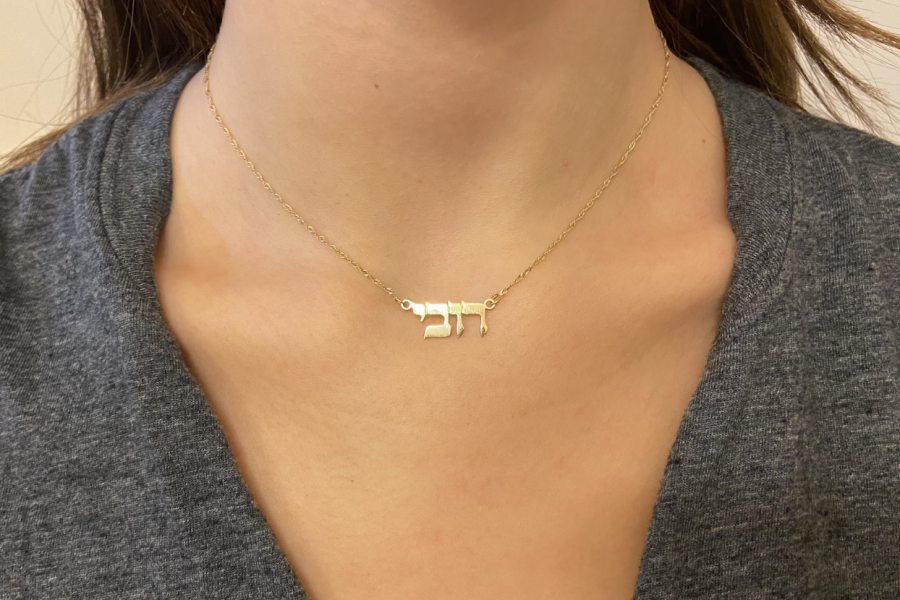Antisemitism fluctuates due to a lack of education about Jewish culture
Ruby Kantor ’24 wears a necklace with her name in Hebrew, embracing her Jewish heritage.
I frequently recall the last day of my sophomore year, and how this one experience taught me the value of words.
I remember walking into my Spanish class to find my classmates indulging in food and drinks in celebration of summer. Everyone was swarming my desk, waiting their turn to get the bagels that had been placed there for the class.
“Why are all of the bagels on MY desk?” I jokingly said.
“Well, because you’re Jewish,” said my classmate. “Jews love bagels.”
I had never felt more uncomfortable in my life. I could feel the eyes of my peers shoot directly at me, but I sunk my head in an attempt to avoid any awkward glares. Growing up, I was always openly proud of my Jewish identity, but at this moment I was deeply ashamed. But why?
I didn’t understand.
I was mad at myself for being offended. I told myself that I was just being sensitive and that my classmate didn’t have the intention of hurting me. But this just didn’t sit right with me. I have seen stories of antisemitism in my community, but never did I think I would be the victim of it.
Whether you realize it or not, microaggressions towards Jewish people have become quite common in modern day society. One of the most relevant examples is the use of the acronym “JAP.” According to Urban Dictionary, “JAP stands for a Jewish American Princess who grew up in a wealthy household and neighborhood […] who is known for being bratty and snotty and wearing overpriced clothes.”
I often hear my peers, some of whom aren’t even Jewish, using this phrase to describe other people. This slur labels someone as reliant on materialistic items for happiness, and suggests that their money is inherited from their parents rather than earned. It is incredibly damaging, but is said in a very casual manner by people all of the time. I have a problem with this.
“Today’s antisemitism is not only directed at Israelis, and it does not always take the form of traditional slogans or hate speech,” Fast Company says. “Contemporary antisemitism manifests itself in various forms, such as GIFs, memes, vlogs, comments and reactions such as likes and dislikes on the platforms.”
I often hear my peers, some of whom aren’t even Jewish, using this phrase to describe other people. This slur labels someone as reliant on materialistic items for happiness, and suggests that their money is inherited from their parents rather than earned
— Ruby Kantor
After researching how antisemitism demonstrates itself in 2022, I am no longer confused as to why my classmate’s comment was painful to me. I have realized that not all hate speech sounds hateful to the naked ear. Just because she didn’t use explicitly cruel rhetoric, it doesn’t mean her words didn’t have hurtful implications. Target language comes in all shapes and forms, and is likely to change as society evolves.
I feel that the continuity of this unrecognized, hate speech is due to limited education surrounding Judaism. I interviewed 12 Staples students, three from each grade, and asked them all the same question: “What have you learned in school about Jews?” All 12 respondants said they have only learned about the Holocaust.
In history lessons, Jews are commonly elucidated as victims and scapegoats. They are taught as people who have faced prejudice, and who have been blamed for acts of misdemeanor. America’s education system throws in lessons about the Holocaust, but fails to go in-depth about the many other aspects of Jewish history and culture.
Why are students only learning about a single event? It would be like only teaching children about slavery, but leaving out people like Martin Luther King Jr. who have served as a front to hatred. A broader scope of information will ultimately lead to more awareness surrounding microaggressions, and will decrease their frequency. There are so many significant figures and events that have led Jews to where they are now, and those successes are definitely worth learning about.

Inklings Paper Managing Editor, Ruby Kantor ’24, claims she decided to join the paper for many different reasons.
“I really liked the different...






























































